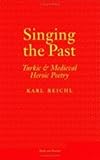Singing the Past : Turkic and Medieval Heroic Poetry / Karl Reichl.
Material type: TextSeries: Myth and PoeticsPublisher: Ithaca, NY : Cornell University Press, [2018]Copyright date: ©2000Description: 1 online resource (240 p.) : 4 maps, 1 halftoneContent type:
TextSeries: Myth and PoeticsPublisher: Ithaca, NY : Cornell University Press, [2018]Copyright date: ©2000Description: 1 online resource (240 p.) : 4 maps, 1 halftoneContent type: - 9781501732164
- 894/.3 21
- PL28.2
- online - DeGruyter
| Item type | Current library | Call number | URL | Status | Notes | Barcode | |
|---|---|---|---|---|---|---|---|
 eBook
eBook
|
Biblioteca "Angelicum" Pont. Univ. S.Tommaso d'Aquino Nuvola online | online - DeGruyter (Browse shelf(Opens below)) | Online access | Not for loan (Accesso limitato) | Accesso per gli utenti autorizzati / Access for authorized users | (dgr)9781501732164 |
Frontmatter -- Contents -- Foreword -- Acknowledgments -- Note on Transcription, Pronunciation, and Translations -- Introduction -- CHAPTER ONE. Turkic Bards and Oral Epics -- CHAPTER TWO.Variations on Epic and History -- CHAPTER THREE. In Search of the Heroic Lay -- CHAPTER FOUR. Heroic Epic and Tribal Roots -- CHAPTER FIVE. Heroic Past and Poetic Presence -- Conclusion -- APPENDIX ONE. The Text of Tdwke-batü -- APPENDIX TWO. The Text of Ormanbet-biy -- Works Cited -- Index
restricted access online access with authorization star
http://purl.org/coar/access_right/c_16ec
Oral epic poetry is still performed by Turkic singers in Central Asia. On trips to the region, Karl Reichl collected heroic poems from the Uzbek, Kazakh, and Karakalpak oral traditions. Through a close analysis of these Turkic works, he shows that they are typologically similar to heroic poetry in Old English, Old High German, and Old French and that they can offer scholars new insights into the oral background of these medieval texts.Reichl draws on his research in Central Asia to discuss questions regarding performance as well as the singers' training, role in society, and repertoire. He asserts that heroic poetry and epic are primarily concerned with the interpretation of the past in song: the courageous deeds of ancestors, the search for tribal and societal roots, and the definition and transmission of cultural values. Reichl finds that in these traditions the heroic epic is part of a generic system that includes historical and eulogistic poetry as well as heroic lays, a view that has diachronic implications for medieval poetry.Singing the Past reminds readers that because much medieval poetry was composed for oral recitation, both the Turkic and the medieval heroic poems must always be appreciated as poetry in performance, as sound listened to, as words spoken or sung.
Mode of access: Internet via World Wide Web.
In English.
Description based on online resource; title from PDF title page (publisher's Web site, viewed 26. Apr 2024)


